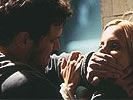Eye For Film >> Movies >> Trauma (2004) Film Review
Ben (Colin Firth) emerges from a two-week coma to discover that his wife Elisa (Naomie Harris) is dead from a car accident. He must grieve alone, however, for his awakening coincides with the news that the body of popular singer Lauren Parris has been dredged out the water.
Ben attempts to rebuild his life, moving into a new apartment. He makes the acquaintance of the landlady, Charlotte (Mena Suvari), who, learning of his situation, takes him to visit a medium (Brenda Fricker). Disturbingly she tells Ben that Elisa is still alive.

Meanwhile the police, in the form of Inspector Jackson (Kenneth Cranham) are taking an interest in Ben as a potential suspect in Lauren's murder...
The plusses first:
Trauma looks good, with moody production design and lighting for the London exteriors - thought it would be nice to see a different part of the UK for once, especially since the East End locations only serve to recall the not dissimilar, though superior, Spider - and Isle of Man studio interiors.
Likewise Marc Evans's helming is confident and stylish, with the director using a similar range of devices as his previous excursion into this territory, My Little Eye - surveillance cameras, glitch edits, defamiliarised compositions - to create a disorienting, edgy mood, over which are laid effective, if predictable, soundscapes of nails across blackboard screeches and pizzicato strings.
Nor can Firth's haunted performance be faulted, though Suvari feels somewhat misplaced amidst the likes of Fricker and Cranham - both reliable, as ever - and comes across as too obvious a concession to the US marketplace.
But, for all these positives, there's one fatal flaw.
Trauma simply fails to engage the viewer's interest. Our position, ironically, is somewhat akin to that of Lauren Parris's mourning fans: we simply don't care about Ben's plight. Unfortunately, we're also stuck with it for 90 minutes, creating an experience reminiscent of that drunk in the pub, or crazy on the bus, who simply will not shut up and go away.
Nor does the murder subplot really convince. How easy would it be to abduct a major celebrity, who must surely have a bodyguard? Would she go down the shops by herself? And would everyone really care? Here there's a brief, but telling, reference to Diana, where, as we all surely know, there was always that element of a cycle of silence whereby no one in the mass media was willing, or able, to utter what many were undoubtedly thinking: Yeah, yeah, get over it.
Then there's also the difficulties caused - admittedly understandable in practical production terms - of having a fictional figure, whereby the environmental wallpaper aspect - the playing of her music in the background, the billboards and media images, etc - just doesn't have the required recognition value, despite (or maybe because of) the filmmaker's conscious use of cover versions of well-known songs.
Those who have seen My Little Eye will recognise both symptoms: Evans is a good director, but has problems with getting plausible characters and situations to work with.
Ultimately, then, one is left with a strong sense of style over substance and of a production where the filmmakers were unwilling to get down and dirty and make an honest-to-goodness no nonsense genre film; of preferring the veneer of respectability granted by the psychological thriller label over the horror one and of being more concerned with broadsheet reviews than the multiplex masses.
Reviewed on: 25 Aug 2004





















